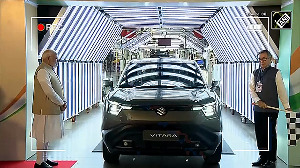Remember those dark, dingy places that were called banks even up to the early 1980s? The musty smell of old files, the sleepy guard, the narrow grilled entrance. And waiting for hours at the cash counter because the teller was having his second cup of tea and would not be distracted from his colleague's description of his latest illness.
Then waiting some more for your passbook because the bank's official Man Friday had to be found to transfer the ledgers from one table to the next. And remember the trauma of opening a new account, where all the tellers and staff would glare at you accusingly for giving them more work to do?
If you managed to get through those bad old days without having to take a loan, count yourself lucky. If you did have to go through that Herculean task, you will, no doubt, remember the reports you had to file, the zillions of forms that had to be filled in 'just so', the interminable waits to meet the various bank officials.
And this was something everyone had to go through; there were few foreign banks, and those were way beyond the reach of the average middle-class customer. And so, everyone suffered together.
Sea of change. With liberalisation of the financial sector came new private sector banks, which pulled out all stops because they knew they had to establish their reputation fast. Swank air-conditioned branches, polite staff willing to go that extra mile, efficient service, value-added offerings. They made the average customer realise that banking could be a pleasure.
Then came the ATMs, which cut out the need to visit the bank regularly. And with the growing popularity of these banks came new, innovative products. Banks moved from conventional deposit products to hybrid deposit products, and even started selling insurance and mutual fund products. Today, banks are seen as financial supermarkets, where almost all your financial needs are met under one roof.
Building wealth. From a mere custodian of your resources, banks now help in building your wealth. And how do they do this? First, by managing your savings account. If you opt for this facility and if your deposit exceeds a specified amount in the savings account, the bank automatically sweeps the excess to a fixed deposit, allowing you to enjoy a higher interest.
Second, you get easy access to loans, and so can build your assets. For instance, you can get a home loan easily, which not only allows you to perhaps match your rent outgo with your EMI payment, it also helps build capital assets.
Banks are also ready to provide you overdraft facilities against your deposits, shares and other financial securities, to meet short-term fund requirements. In a market where asset prices appreciate substantially higher than bank interest rates, leveraging bank borrowings has the potential to make you a millionaire. You can mortgage your property, and even securitise the rent you get from your tenant to borrow further. If you judiciously invest these amounts, you can create further wealth.
Once you have created a certain amount of wealth, banks offer to manage it for you. Use these services to let the bank handle your investments, take care of things like applying for rights issues, public issues, new fund offers, credit your interest or dividend cheques, and reconcile your bank statement.
In more mature economies, private bankers also offer specialised services like tax-efficient solutions to yacht ownership and support services for vessel management, international estate planning and wealth succession plan. The day is not far when banks will take care of all your financial needs, literally from the cradle to the grave.
The author is CEO, North and East, ING Vysya Bank.





